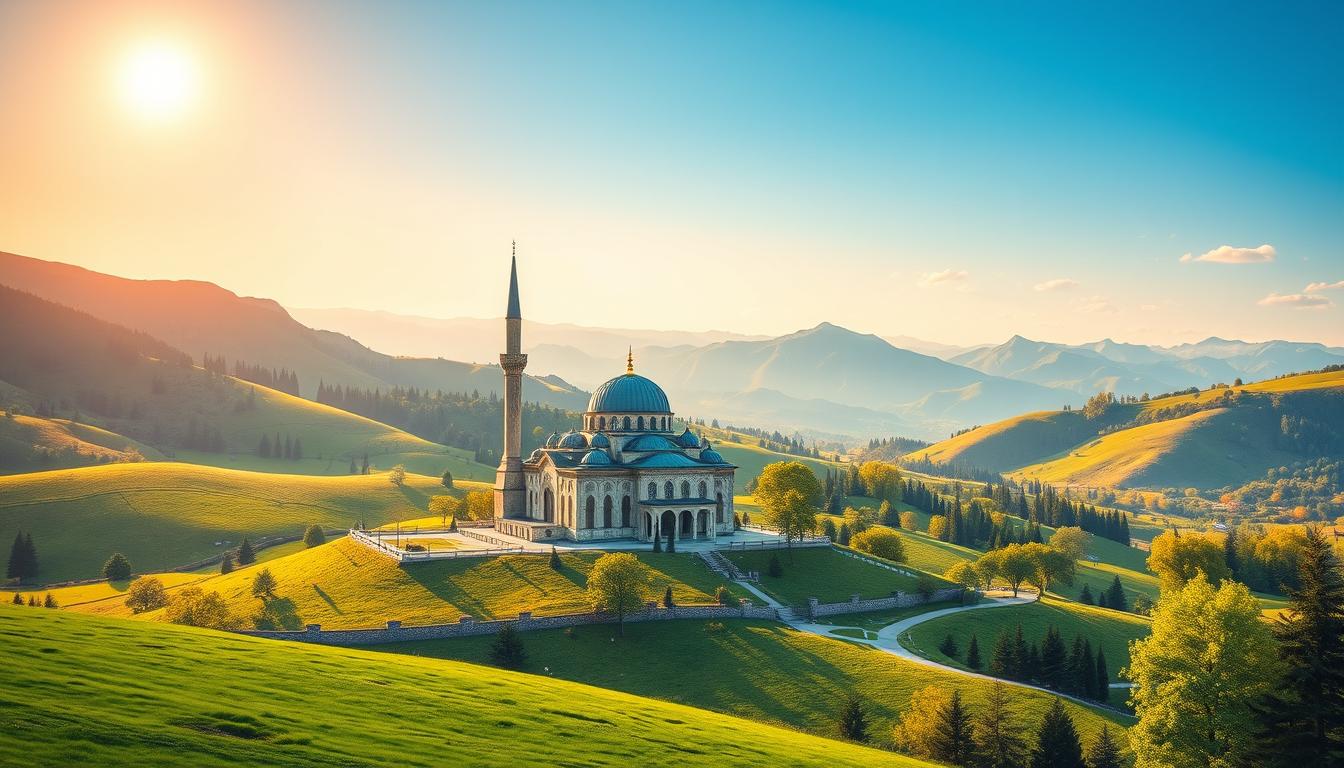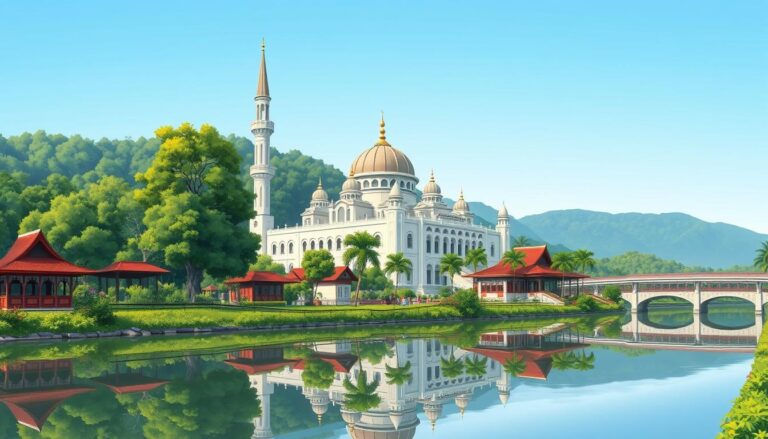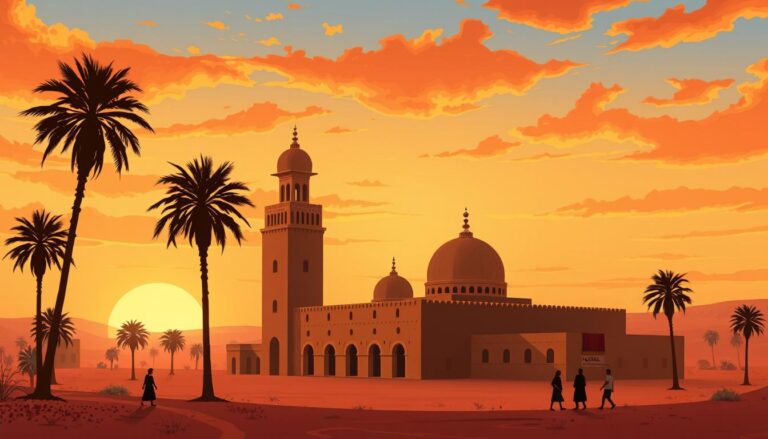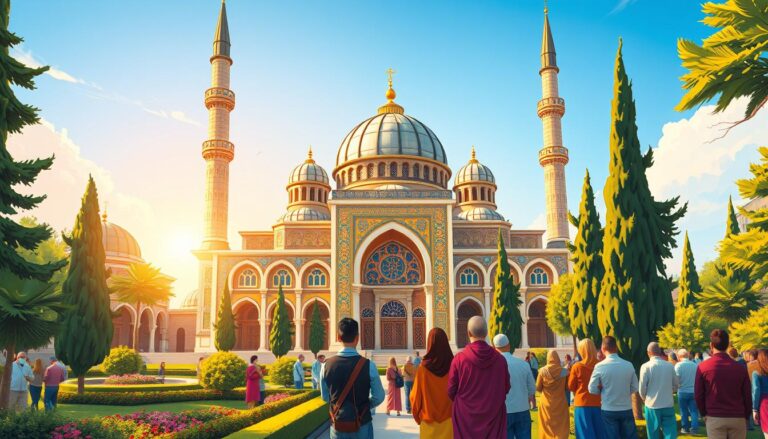Islam in Kosovo
Islam has a long history in Kosovo, starting with the Ottoman conquest in the 14th century. Before the Battle of Kosovo in 1389, the area was mostly Christian. The Ottoman Empire ruled Kosovo from 1389 to 1912, making Islam widespread among Albanians.
During this time, many Albanians, both Christian and Muslim, married each other. Some even kept their Christian faith secretly. After World War II, Kosovo became more secular under Yugoslavia’s rule. But, with the end of communism, religion saw a comeback.
Now, 95.6% of Kosovo’s people are Muslims, mostly Albanians. There are also Bosniaks, Gorani, and Turks who speak different languages but share the Islamic faith.
Historical Overview of Islam in Kosovo
The story of Islam in Kosovo starts with the Ottoman conquest of the Balkans in the 14th century. Before the Ottomans, the Catholic and Orthodox Churches fought over the Albanians. The Ottomans took advantage of this to bring Islam to Kosovo.
The Islamization of Kosovo was complex. Many people became Muslims but secretly kept Catholic traditions. This was known as “crypto-Catholicism.”
Arrival of Islam during Ottoman Rule
In the 16th century, more people started converting to Islam. This was due to high taxes, Ottoman punishments, and forced conversions. Converts didn’t have to pay the cizje, a tax on non-Muslim males, which made conversion appealing.
Conversion Patterns and Factors
Several reasons led to the Islamization of Kosovo. The Catholic Church was weaker than the Serbian Orthodox Church in the Ottoman Empire. The Bektashi Order of Dervishes also played a role, showing the similarities between Islam and Christianity.
The practice of Crypto-Catholicism was banned in the early 18th century. This was done by church decrees.
“The Islamization of Kosovo was not a straightforward process, as a phenomenon of ‘crypto-Catholicism’ developed, where large numbers of people would convert officially to Islam but follow Catholic rites in private.”
Today, Kosovo has one of the highest percentages of Muslims in Europe. About 95.6% of the population is Muslim. The Islamic Community of Kosovo is the main Muslim organization, led by Grand Mufti Naim Tërnava.
Demographics and Population Statistics
Kosovo, a small Balkan nation, has a diverse religious scene. The 2011 census showed that 88% of the population is Muslim. Other groups include 5.8% Catholic, 2.9% Eastern Orthodox, 2.9% without religion, and 0.4% from other religions.
The Pew Research Center’s 2015 study found that in 2010, 97.5% of Kosovo’s people were Muslim. Only 2.1% were Christian. The rest were from other religions or had no religion.
The Muslim population in Kosovo is mostly Sunni. There’s also a big Sufi Tarikat community of about 60,000. People from ethnic groups like Ashkali, Bosniaks, Egyptians, Gorani, Roma, and Turks are mostly Muslim.
On the other hand, ethnic Serbs are mostly Serbian Orthodox. Montenegrins and some Roma are Christian Orthodox. Croats are mostly Catholic.
The Religious composition in Kosovo is complex. The 2011 census faced challenges, like a boycott by ethnic Serbs. This led to undercounts of some religious groups.
“The constitution guarantees freedom of religion and expression, emphasizes state neutrality regarding religion, and protects the country’s religious heritage.”
Kosovo’s constitution and laws protect religious freedom. They ensure the rights of all religious groups. This includes the Kosovo Islamic Community, Serbian Orthodox Church, Catholic Church, Hebrew Belief Community, and Evangelical Church.
Islamic Practices and Traditions
In Kosovo, most Muslims follow Sunni Islam. A big part of them are Sufi followers. The Bektashi Order of Dervishes, a Sufi group, helped spread Islam in the Ottoman era. This mix of Islamic and local traditions makes the Kosovar Muslim community unique.
Sunni Islam and Sufi Orders
Most Kosovo Muslims are Sunni. But, the country also has a strong Sufi tradition. The Roma Muslim community mainly practices Sufism. This blend of Sunni and Sufi ways has shaped Kosovo’s Islamic identity.
“Kosovo has a good relationship with Turkey and looks up to the Turkish Islamic model, similar to secular Turkey.”
Yet, worries have grown about a shift towards stricter Islam. This could be due to foreign groups and money. Such a change might threaten Kosovo’s open Islam and its democracy.
Despite these worries, Islamic practices and traditions are key to Kosovo’s culture. They help create a strong sense of identity and community among Muslims.
Islam in Kosovo
Islam has deeply influenced Kosovo’s culture. Over 95% of the people here are Muslim. The Ottoman conquest brought Islam to the region, shaping traditions and views.
The Islamic Community of Kosovo plays a key role. It keeps Islamic values alive, helping Kosovar Muslims feel connected. The mix of Islamic and Albanian traditions has created a unique culture in Kosovo.
Navigating the Complexities of Identity
Islam’s role in Kosovar culture is complex. Debates over hijabs in schools have caused controversy. Some see it as a step back. The diaspora has faced hate crimes, showing the need to fight Islamophobia.
But, there’s a pushback against Islamophobia. Campaigns to allow hijabs in schools show this effort. It’s about making Islamic identity a part of Kosovar society.
“The wearing of Arab headscarves for girls in and out of schools is a big social step backwards.”
– Alma Lama, former Kosovar Ambassador to Italy
The relationship between Islam and Kosovar culture is complex. It’s influenced by history, politics, and society. Islam is a key part of the Kosovar identity.
Islamic Institutions and Organizations
In Kosovo, the Islamic Community of Kosovo (Bashkësia Islame e Kosovës) is key. It was set up in 1993. It helps keep and grow Islamic ways, customs, and beliefs in Kosovo.
The community has 8 regional councils. These cover places like Prishtina, Gjilan, and Prizren. The Grand Mufti, Naim Tërnava, leads the community. He speaks for Kosovo’s Muslims.
The community has faced big problems. In 1999, Yugoslav Serb police burned down their main archive. This loss was for 500 years of records. Also, the Hadum Suleiman Aga library in Gjakova was destroyed in March 1999.
Despite these losses, the Islamic Community of Kosovo is still important. It organizes religious and cultural events. It also helps during crises, like the 2019 earthquake in Albania.
The Islamic Community’s Role and Influence
Kosovo’s Muslims look up to the Islamic Community of Kosovo. There are now over 800 mosques, up from 200 in 1999. A new mosque is built every month.
But, the community faces new challenges. There are worries about radical ideas, especially with young people going to foreign wars. The government has banned religious clothes in schools, causing protests.
The Islamic Community of Kosovo is vital for Kosovo’s religious and cultural scene. It represents Muslims and keeps Kosovo’s Islamic heritage alive.
“The Islamic Community of Kosovo plays a vital role in maintaining and promoting Islamic practices, traditions, and values within the Kosovar society.”
Challenges and Issues Faced by Muslim Communities
The Muslim community in Kosovo faces many challenges. The Kosovo War destroyed many mosques and Islamic sites. This loss has deeply affected the Kosovar Muslim population.
There are also worries about foreign funding, especially from Saudi Arabia. This funding has raised concerns about religious extremism. The Kosovar Muslim community is trying to navigate these issues carefully.
- About 95% of Kosovo’s population is officially Muslim.
- In 2014, Kosovo allegedly had the highest number of citizens per capita joining ISIS.
- A 2017 report by the Norwegian Institute of International Affairs indicated that many practicing Muslims in Kosovo feel under attack.
The complex dynamics of religious diversity and secularism in Kosovo have also posed challenges for the Muslim community. While the constitution guarantees freedom of religion, the country is officially a secular state. This has led to tensions and debates about the role of Islam in the public sphere.
“The majority of those interviewed viewed pious Kosovar Muslims as influenced by foreign Islamist powers through ideological brainwashing, material incentives, or a rebellious appeal.”
The lack of a legal framework for religious communities in Kosovo has also caused tensions. There are no clear rules for property, finances, and rights. This has led to unauthorized constructions and funding issues, making things worse for Kosovar Muslims.
As the Kosovar Muslim community deals with these challenges, finding a balance is key. They must preserve their identity while addressing broader society’s concerns. A collaborative effort between the government, religious leaders, and the community is needed. This will help promote religious freedom and social cohesion.
Islam and the Kosovo War
The Kosovo War of 1998-1999 deeply affected the Islamic heritage and institutions in the area. The Yugoslav Serb army targeted and destroyed many Islamic sites. This included 225 out of 498 mosques in use at the time.
Sufi lodges, madrasas, and libraries were also hit hard. This was part of a plan to erase Albanian cultural identity.
The loss of these sites has hurt the Kosovar Muslim community a lot. The war destroyed Islamic sites and disrupted Muslim lives. It caused displacement and trauma.
The Yugoslav Serb army aimed to reduce Islam’s presence in the region. This was a big blow to the community’s culture and identity.
Destruction of Islamic Heritage
The Kosovo War left a lasting mark on the Islamic heritage of the region. The Yugoslav Serb army damaged or destroyed 225 mosques out of 498. They also targeted Sufi lodges, madrasas, and libraries.
This was a deliberate attempt to erase the Albanian Muslim culture. The loss has been huge for the community. These sites were important for both religion and learning.
The targeting of Islamic sites was part of a bigger plan. It was aimed at ethnic cleansing and erasing Albanian culture. This act of vandalism has had a lasting impact on the Kosovar Muslim community.
Interfaith Dynamics and Religious Diversity
Kosovo is known for its rich religious diversity. Most people identify as Muslim, with about 1.9 million residents. But, there’s also a big Catholic population, with around 60,000 Kosovo Albanians. Plus, small communities of Croats, Jews, and Roma live there, practicing different faiths.
Despite the diversity, interfaith relations in Kosovo have faced challenges. The Kosovo War saw Serbian forces destroy Islamic sites, and Albanians destroy Orthodox churches. This showed the need for better understanding and cooperation among faiths.
After the war, efforts to improve interfaith dialogue started. The World Conference on Religion and Peace helped in 1999. They suggested creating a Kosovo Interfaith Council and protecting religious sites. They also wanted to make educational materials on different faiths.
“Religion cannot be labeled as a significant contributing factor to the conflict between Serbs and Albanians in Kosovo.”
Kosovo’s history of religious tensions still affects interfaith relations. But, the country’s commitment to religious freedom and the separation of church and state helps. This sets the stage for ongoing efforts to promote mutual understanding and respect among diverse religious communities.
Islam and Secularism in Kosovo
Kosovo is a secular state, where religion and government are separate. Everyone is treated equally, no matter their beliefs. This setup has shaped how Islam and other religions are seen in public life. Even though Muslims make up about 95% of the population, there’s been little religious talk or displays of Islamic culture lately.
The history of religious identity and the need to keep cultural heritage alive have sparked debates. These debates are about finding the right balance between secularism and the role of Islam in society. The 2011 census showed that 95.6% of people in Kosovo are Muslim, with smaller groups of Roman Catholics and Serbian Orthodox.
The Hanafi Sunni school is the most common among Muslims, with many Tarikat and Bektashi followers. Kosovo’s constitution ensures freedom of religion and equal rights for all. It also bans discrimination based on religion.
“The majority of Kosovan Albanians are Muslim, with some also identifying as Christian. Most Kosovan Serbs belong to the Serbian Orthodox Church, while other ethnic groups such as Ashkali, Bosniaks, Egyptians, Gorani, Roma, and Turks are predominantly Muslim.”
Despite discussions about religion’s role, Kosovo remains committed to secularism. Finding a balance between cultural preservation and secular values is an ongoing challenge in Kosovo.
Future Prospects and Trends
Kosovo is working hard to rebuild after conflict and grow socially and politically. The future of Islam in the country is a big topic. Most Muslims in Kosovo keep their culture and faith strong. But, worries about foreign money and religious extremism exist. The government’s push for secularism and keeping all religions respected could influence Islam’s role in Kosovo.
The Kosovar Muslim community has big challenges and opportunities ahead. The Islamic Community of Kosovo and other Muslim groups must adjust to new times while staying true to their faith. They need to balance old traditions with new ideas and fight against radicalism.
Yet, there are promising trends for Islam in Kosovo. The country’s focus on secularism and diversity, along with the Muslim community’s resilience, suggests a bright future. As Kosovo grows closer to the European Union, Muslims will have more chances to join in politics, business, and society. This will help the Muslim community grow stronger in Kosovo.
“The future of Islam in Kosovo is not without its complexities, but with the right balance of tradition and modernity, the Kosovar Muslim community can thrive and contribute to the country’s continued progress.”
Kosovo’s journey forward will impact the future of Islam in the country in many ways. From keeping different religions together to the changing world around them, many factors will shape Islam’s place in Kosovo. By facing these challenges and opportunities, the Muslim community can be a key part of Kosovo’s future.
Conclusion
The history of Islam in Kosovo is deeply tied to the region’s rich culture. From the Ottoman conquest to today’s challenges, Muslims have shaped Kosovo’s identity and landscape. The Islamization of Kosovo, though complex, has made it mostly Sunni Muslim with a strong Sufi tradition.
The Islamic Community of Kosovo is key in keeping Islamic practices alive. Kosovo values secularism and religious diversity, affecting its relationship with Islam. Despite challenges like the destruction of Islamic sites during the Kosovo War and worries about foreign influence, the Muslim community remains strong.
As Kosovo grows, Islam’s role in its culture and society will likely stay important. This article’s summary and key points show Islam’s significance and the hurdles it faces in Kosovo.
Source Links
- Kosovo – United States Department of State
- Religion in Kosovo
- Kosovo: Is conservative Islam gaining ground?
- Islam in Kosovo
- Kosovo – Religion, Islam, Christianity
- Kosovo – United States Department of State
- National Profiles | World Religion
- The Changing Face of Islam in Kosovo
- A Growing Split Between Islamic, Secular Identities In Kosovo
- The desperate desire to be ‘European’ – Adem Ferizaj
- The Presence of Iran and Shi’ism in Kosovo – İRAM Center | Center for Iranian Studies in Ankara
- Islamic Community of Kosovo
- Why is there discrimination against Muslims in Kosovo? – Friedrich Püttmann
- Risk of Radicalisation: Kosovo Struggles with Informal Worship Places – Prishtina Insight
- ‘Let’s Just Be Albanians’: A New Movement In Kosovo Calls On Muslims To Abandon Islam
- The (Really) Moderate Muslims of Kosovo
- RELIGION REPORT
- Europe Report, Nr. 105: Religion in Kosovo
- Religion and Living Arrangements Around the World
- Kosovo – United States Department of State
- Kosovo touts ‘Islam Lite’
- The Future of the Global Muslim Population
- Kosovo | AFPC Almanac
- BTI 2024 Kosovo Country Report
- Kosovo conflict | Summary & Facts
- The Balkan Umma and the Making of ‘Euro-Islam’







